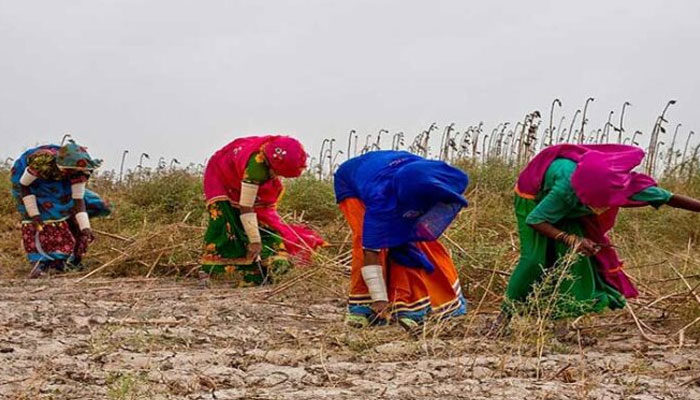PSA spearheads empowerment of agri women
Islamabad:The formation of the platform of Provincial Stakeholders Alliance (PSA) was a milestone for the rights and empowerment of women agricultural workers in Punjab. The event in this regard proved to be a significant step in addressing the issues raised in the research report titled ‘The Hands that Feed Us: Struggles of Women Agricultural Workers in Pakistan’ produced by Awaz Foundation Pakistan: Centre for Development Services, Jaag Welfare and the Asian Forum for Human Rights and Development (Forum-Asia), says a press release.
The Provincial Stakeholders Alliance is a platform of representatives from various relevant stakeholders, including government agencies, non-governmental organisations, civil society organisations, bar council, and representatives from media.
Rural women in Pakistan’s agriculture sector, often overlooked, confront significant challenges such as lower wages, malnutrition, discrimination, and exploitation due to patriarchal norms. It was already highlighted by Awaz Foundation Pakistan's study that underscored issues like limited legal awareness and urged action from district departments and ministries.
Nadeem Ashraf, Member Punjab of the National Commission for Human Rights, said, “A key step in raising awareness of the rights of women agricultural workers is the formation of the Provincial Stakeholders Alliance. To guarantee their empowerment and well-being, we must all work together to put the appropriate measures into place. The platform, aimed at fostering the empowerment of women agricultural workers, brought together various stakeholders committed to creating positive change.”
Zia ur Rehman, chief executive of AwazCDS-Pakistan, introduced the purpose of the PSA, emphasising, “This platform aims to be a catalyst for positive change, ensuring the rights and empowerment of women agricultural workers are prioritised and protected by ensuring legislation for the Punjab Agricultural Workers especially for women."
The platform allowed the stakeholders to delve into essential discussions, The Deputy Secretary Labour & Human Resource Department Punjab shared that there is need to bring policy for agriculture and workers since we do not have any. He further added that the Government of Punjab is undertaking unprecedented and substantial labour law reforms. These efforts involve rationalising, consolidating and simplifying over two dozen labour laws into comprehensive Labour Codes. This significant initiative is aimed at ensuring compliance with constitutional guarantees and international obligations and also the Government is collaborating with the ILO to enhance Fundamental Principles and Rights at Work (FPRW) in the lower tier of the agriculture sector supply chain in Punjab this expansion aims to strengthen labour standards, protect workers in the agriculture sector.
Kanwal Parvaiz, Member Punjab Assembly said, “Working Conditions and Working hours; currently, there is no law in place to regulate the working conditions of the agriculture workers, we are working to introduce new laws for regulating working hours and working conditions of the workers engaged in the agriculture sector especially women.
Different civil society leaders also expressed that by employing a multifaceted approach that combines advocacy, research, capacity building and public awareness, CSOs can effectively advocate for the legislation for the protection and welfare of women agricultural workers in Punjab. These efforts can lead to significant improvements in their working conditions, wages, and overall quality of life.
Zia ur Rehman expressed that PSA will coordinate to enhance advocacy efforts to promote legislation for the Women Agricultural Workers and will also advocate for increased programs and increased budget allocation for support of women agricultural workers. He also took the lead in finalizing the ‘Follow-up actions,’ outlining the practical steps that would be taken to translate discussions into meaningful actions.
Nadeem Ashraf, Member Punjab of the National Commission for Human Rights thanked all participants for their insights and contributions and also said that we need to turn our discussions into tangible outcomes, ensuring the empowerment of women agricultural workers is not just a goal but a reality.
-
 Savannah Guthrie Sends Desperate Plea To Mom Nancy Kidnapper
Savannah Guthrie Sends Desperate Plea To Mom Nancy Kidnapper -
 NBA All-Star 2026 Shake-up: Inside The New USA Vs World Tournament Format
NBA All-Star 2026 Shake-up: Inside The New USA Vs World Tournament Format -
 Warner Bros Consider Reopening Deal Talks With Paramount, Says Reports
Warner Bros Consider Reopening Deal Talks With Paramount, Says Reports -
 Andrew Mountbatten Windsor Faces Future With UK MPs, Says Expert
Andrew Mountbatten Windsor Faces Future With UK MPs, Says Expert -
 Shamed Andrew Told 'nobody Is Above The Law' Amid Harrowing Silence
Shamed Andrew Told 'nobody Is Above The Law' Amid Harrowing Silence -
 Gisele Bundchen Melts Hearts With Sweet Bike Ride Glimpse Featuring Son
Gisele Bundchen Melts Hearts With Sweet Bike Ride Glimpse Featuring Son -
 Prince William Found Meghan Markle ‘quite Refreshing’ At Start
Prince William Found Meghan Markle ‘quite Refreshing’ At Start -
 Kate Middleton Knew Should Could Not Be ‘voice Of Reason’ With Prince Harry
Kate Middleton Knew Should Could Not Be ‘voice Of Reason’ With Prince Harry -
 Rihanna Has Wardrobe Malfunction At A$AP Rocky Fashion Show
Rihanna Has Wardrobe Malfunction At A$AP Rocky Fashion Show -
 Prince Harry Felt System Had ‘one Rule For Him, One For Prince William’
Prince Harry Felt System Had ‘one Rule For Him, One For Prince William’ -
 Jake Paul's Fiancée Sends Him Over The Moon Over Stunning Victory
Jake Paul's Fiancée Sends Him Over The Moon Over Stunning Victory -
 Harper Beckham Sends Valentine’s Love Amid Brooklyn Family Drama
Harper Beckham Sends Valentine’s Love Amid Brooklyn Family Drama -
 Why Prince William, Kate Middleton 'partnership' Is Important For Monarchy
Why Prince William, Kate Middleton 'partnership' Is Important For Monarchy -
 Katie Price Drama Escalates As Family Stays In Touch With Ex JJ Slater
Katie Price Drama Escalates As Family Stays In Touch With Ex JJ Slater -
 Critics Target Palace Narrative After Andrew's Controversy Refuses To Die
Critics Target Palace Narrative After Andrew's Controversy Refuses To Die -
 Sarah Ferguson’s Delusions Take A Turn For The Worse: ‘She’s Been Deserted’
Sarah Ferguson’s Delusions Take A Turn For The Worse: ‘She’s Been Deserted’




